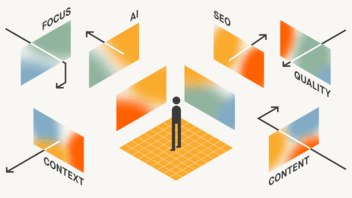AI tools like ChatGPT and others can instantly generate human-like content at the push of a button. But where does AI reach its limits in content marketing – and why are high-quality, expert-driven pieces more important than ever?
AI in content marketing: Why high-quality content matters more than ever
In a nutshell: AI in content marketing
- ChatGPT, Perplexity, and Google's AI Search demonstrate how strongly artificial intelligence is transforming research, content creation, user behavior, and search experiences.
- Traditional search results are losing relevance – new strategies are needed to stay visible in AI-powered searches.
- The flood of generative AI content leads to uniformity: interchangeability becomes a problem.
- Clear differentiation through original content, real perspectives, and human relevance is becoming more valuable.
- AI is a helpful production tool, but it can’t replace strategic, creative and expert-driven content work done by humans.
ChatGPT, Perplexity, and Google’s AI-powered search: The current state of AI development
In the context of AI-driven content marketing, it’s worth focusing on three major AI platforms: ChatGPT, Perplexity, and Google’s Gemini integration into its search tools. What’s behind each one?
ChatGPT: The trigger of the AI hype
Arguably the most well-known – and according to our traffic data, the most widely used – AI chat tool today is ChatGPT by OpenAI. Its official launch in November 2022 essentially marked the starting point of the ongoing AI hype we’ve been witnessing for nearly two years. For many people the term 'ChatGPT' has even become synonymous with 'AI,' much like 'Google' once stood for internet search.
The underlying large language model (LLM) used for text generation is called 'GPT-X.' Various versions based on GPT-4o currently serve as the foundation. Alongside regular LLM updates, ChatGPT has continuously expanded with new features. Over time, the tool has evolved into a versatile platform that includes real-time web search, video and image generation, programming, and deep research capabilities.
What made ChatGPT hugely popular from the beginning – regardless of its growing feature set – is its simple, intuitive user interface. Users can ask questions or assign tasks via chat prompts, and the AI delivers fast, personalized responses. At the push of a button, without prior expertise, users can generate code, concepts, summaries, and a wide range of content.
Large language model – what is it?
A large language model (LLM) gives text-based AIs like ChatGPT or Google’s Gemini the ability to process natural language (natural language processing, NLP) and generate it (natural language generation, NLG). These language models are called 'large' because they’re trained on massive datasets, often involving hundreds of billions of parameters ('tokens').
However, text-based AI doesn’t actually accumulate knowledge the way humans do. Instead, it learns to express itself fluently by predicting the most likely next character or word in a sequence – a process called probabilistic text generation. That’s why LLMs are often referred to as 'stochastic parrots': they mimic the language patterns they were trained on, arranging words in a statistically probable – and ideally meaningful – order.
This also explains a persistent issue in the technology (and one that may never be fully solved): 'hallucinations,' where the model generates false statements based on incorrectly linked information.
What defines Perplexity?
With the AI tool Perplexity, another strong player has established itself in the field of intelligent research assistants. Unlike many other platforms that rely on the ChatGPT API, Perplexity uses its own large language model – maintaining a degree of independence in how it functions and processes data. Perhaps because of this autonomy, Perplexity has quickly become one of the most popular tools in its category.
From the start, Perplexity was designed as more of a search engine: instead of focusing solely on conversation like ChatGPT, it delivers SERP-style results enriched with numerous source links and real-time information from the web. Its 'deep research' feature is particularly aimed at academic, scientific, and research-driven users – although, as with all AI-based tools, its outputs should always be critically evaluated.
While ChatGPT is often valued as a creative partner in content creation, Perplexity shines as a research assistant during the early ideation phase. Its fact-based, less conversational presentation style and minimalist interface make it well-suited for this specific use case.
What are Google’s 'AI Overviews' (formerly 'SGE') and 'AI Mode'?
Google’s 'AI Overviews' – originally launched as 'SGE' (search generative experience) – rolled out globally in May 2024 and have since been integrated natively into Google Search. As of March 26, 2025, AI Overviews (AIO) are also available in Germany and other EU countries, following earlier rollouts across 100+ countries and languages. For certain types of queries (e.g. 'What is…' questions), AIOs are automatically triggered: Google generates an AI-powered snapshot that summarizes the topic and includes relevant links as cited sources.
Google’s new AI Mode, launched for U.S. users on May 27, 2025, takes it a step further. Unlike AI Overviews, AI Mode isn’t just another SERP feature – it introduces a completely new search tab that merges Google’s familiar interface with an AI chatbot experience. Users can now input long and complex conversational queries and receive tailored responses that may include text, images, tables, or even interactive graphics. While source links are still included (as in AI Overviews), they’re no longer the main focus – the goal is a seamless, conversational response.
According to Google, AI Mode will soon offer deeper personalization by integrating with other Google tools like Gmail or Drive. In the long term, AI Mode could evolve into a true digital assistant – fundamentally reshaping how people interact with Google Search. Compared to AI Overviews, which can be seen as an advanced form of featured snippets, AI Mode signals a much deeper disruption in how users search, discover, and interact with information.
Online search in the age of AI: Maximum competition
The consequences of AI in content marketing are already becoming clear. Below, we explore the impact of AI-generated marketing content from three perspectives:
Search results: More text, less space
AI-generated answers sound natural and often address user queries directly – leaving little need to scroll through traditional search results. The outcome: only a handful of links appear in the AI-generated answer box. And even those may be overlooked, let alone clicked. Competition for the few remaining top positions that actually drive clicks and traffic is therefore intensifying dramatically.
Content, content, content
If content can be generated at the push of a button, it's faster, significantly cheaper, and possible on virtually any topic. Unsurprisingly, the AI Marketing Benchmark Report 2024 by InfluencerMarketingHub shows that nearly 70% of surveyed AI tool users already integrate GenAI into their marketing workflows – with over 35% using it specifically for content creation.
This trend is already visible: more and more AI-generated marketing content is being published online. Created by a growing number of competitors, all competing for a handful of coveted spots in AI-driven search results.
The problem: much of it looks and feels the same. AI text generators rephrase existing knowledge, but they don’t introduce truly new perspectives, creativity, or shifts in thinking. Even the most advanced language models operate within the boundaries of their training data – in other words, what the internet already knows.
The result is a flood of homogeneous AI-generated marketing content – often dismissed as 'AI slop' – across all topics. Standing out in this sea of sameness requires content that doesn’t feel like it was AI-generated.
Instant gratification: Why even click?
Open Google.
Type a question. Get the answer.
Close Google.
Many believe this will become standard user behavior, especially with Google's AIO and AI Mode initiatives. Clicking on external sites becomes less necessary when the search engine itself provides the full answer, tailored to the individual query.
That makes search engines even more of a direct competitor to websites, offering users immediate, natural-language responses – plus maybe a few supplementary links. For certain types of searches (especially informational ones), this could lead to significant drops in website traffic.
Is your brand ready for AI-powered search?
As a GEO agency, we help you strategically optimize your brand for visibility in AI search systems like ChatGPT, Perplexity, Google AIO, and more.
'Now AI writes for me!' – a good idea?
At first glance, AI in content marketing sounds almost too good to be true: budgets shrink, copywriters deliver a week’s worth of work before Monday lunch, organic traffic skyrockets – and by 5 p.m., the team is celebrating their success.
That’s not how it works. Because great content isn’t about producing more – it’s about standing out.
Google E-E-A-T: Many criteria for top rankings
The higher the content quality, the better the chances of achieving top rankings. Quality is judged by each search engine, but Google remains the most influential. Today, Google evaluates content using a variety of factors aimed at reflecting Experience, Expertise, Authoritativeness, and Trustworthiness (Google E-E-A-T).
Google even provides guidelines for creating 'helpful content' – content that is trustworthy, user-focused, and genuinely valuable. Based on these criteria, Google’s Helpful Content System evaluates not only individual pages but also entire domains to determine how useful they are for users. From Google’s perspective, AI-generated content without human editing is explicitly labeled as 'unhelpful.'
To create valuable content, factors like subject-matter expertise, creativity, originality, and a distinctive voice matter just as much as technical accuracy and clear reasoning. Great content must spark interest in the product, the service, and the quality of the information provided.
All of this defines high-quality content that attracts and engages users and drives business results. And as always, that requires one thing above all: real hard work.
Limitations of AI in content marketing
Ironically, this is exactly where the limitations of AI in content marketing become most apparent. A closer look reveals many boundaries that AI (now and likely in the future) simply can't cross. Here's an overview of a few key limitations:
- The quality of training data determines the quality of the output. Poor input equals poor answers.
- AI sticks to predictable paths. That may work for 'mass content' like e-commerce product descriptions generated from structured data, but when it comes to real creativity, AI falls short.
- AI-generated texts often share the same arguments, structures, and tone, making them feel generic.
- Who owns AI-generated content? Copyright and licensing issues remain largely unresolved.
- AI sometimes fabricates facts ('hallucinations'). Even when sources are linked, their credibility can be unclear.
- Weak prompts lead to weak output. LLMs are notoriously bad at counting or handling logic-based tasks.
- The typical AI writing style rarely matches a brand’s voice. Workarounds like Custom GPTs or Google’s Gems exist, but in our experience, editing is almost always required.
How to create content that will be clicked (feat. AI)
To sum it up: AI can speed up production, but its quality is limited by its inherent constraints.
At the same time, AI-generated direct answers in search reduce the number of visible links, meaning users will likely see fewer clickable results overall.
Roadmap for top-notch content creation
The good news: if you’re already creating excellent content, you’re well on your way to staying competitive in the age of AI-driven search. At Moccu, we’ve put together a content roadmap that’s been helping our clients succeed for years.
- Content strategy
Define how content supports overall business goals. - Content audit
Take inventory and evaluate the quality of all existing site content. - Information architecture
Design the site structure: how content will be organized and navigated. - SEO content briefing
Create in-depth briefs for each piece of content – far beyond a keyword list. - Content creation
Professional writers craft clear, brand-aligned content, supported by AI tools. - Expert review
Finalize content in collaboration with subject-matter experts. - Performance tracking & optimization
Continuously measure, analyze, and refine based on performance data.
Moccu: Your agency for digital analytics & performance tracking
We help you understand user behavior, make data-driven decisions, and continuously optimize your marketing strategies – using tools like Google Analytics, Piwik PRO, Hotjar, and more.
Perfect for prep work: Using AI to create best-in-class content
AI is here to stay, and it will only become more capable and widely adopted. But what we currently call 'artificial intelligence' doesn’t replace subject-matter experts, professional writers, agencies, or in-house marketing teams. Instead, AI can help streamline the content creation process.
To use AI effectively, it's essential to recognize its limits and design workflows where human intelligence complements – and overrides – the machine.
In content marketing today, AI delivers the most value in routine, repeatable tasks – especially in areas like SEO and SEA (for more on this, check out our article on SEO, SEA and AI: Potentials & practical applications).
Beyond that, there’s still no real shortcut to high-quality content: true expertise, creativity, and relevance still come from collaborative human effort – with or without AI.
Conclusion: Why this article was not written by AI
The huge advances in the field of LLMs and generative AI make creating content easier than ever. However, AI bots can’t keep up in terms of content and quality. Professionally developed content, written by experienced copywriters and curated by specialists, is still several steps ahead.
Traditional search results won’t disappear entirely in AI-driven platforms like Perplexity or Google AIO, but they will be presented to the user differently. While original sources are still linked, competition for those few placements will be even tougher than today’s top Google rankings, which have played the central role to date.
Rankings will continue to matter – but only truly 'outstanding content' will earn visibility. Superficial AI content doesn't stand a chance. That’s why specialised service providers such as Moccu are becoming even more vital in online content marketing today.
Write to us to learn more about AI in content marketing.
Thank you!
We’ll get back to you as soon as possible.






